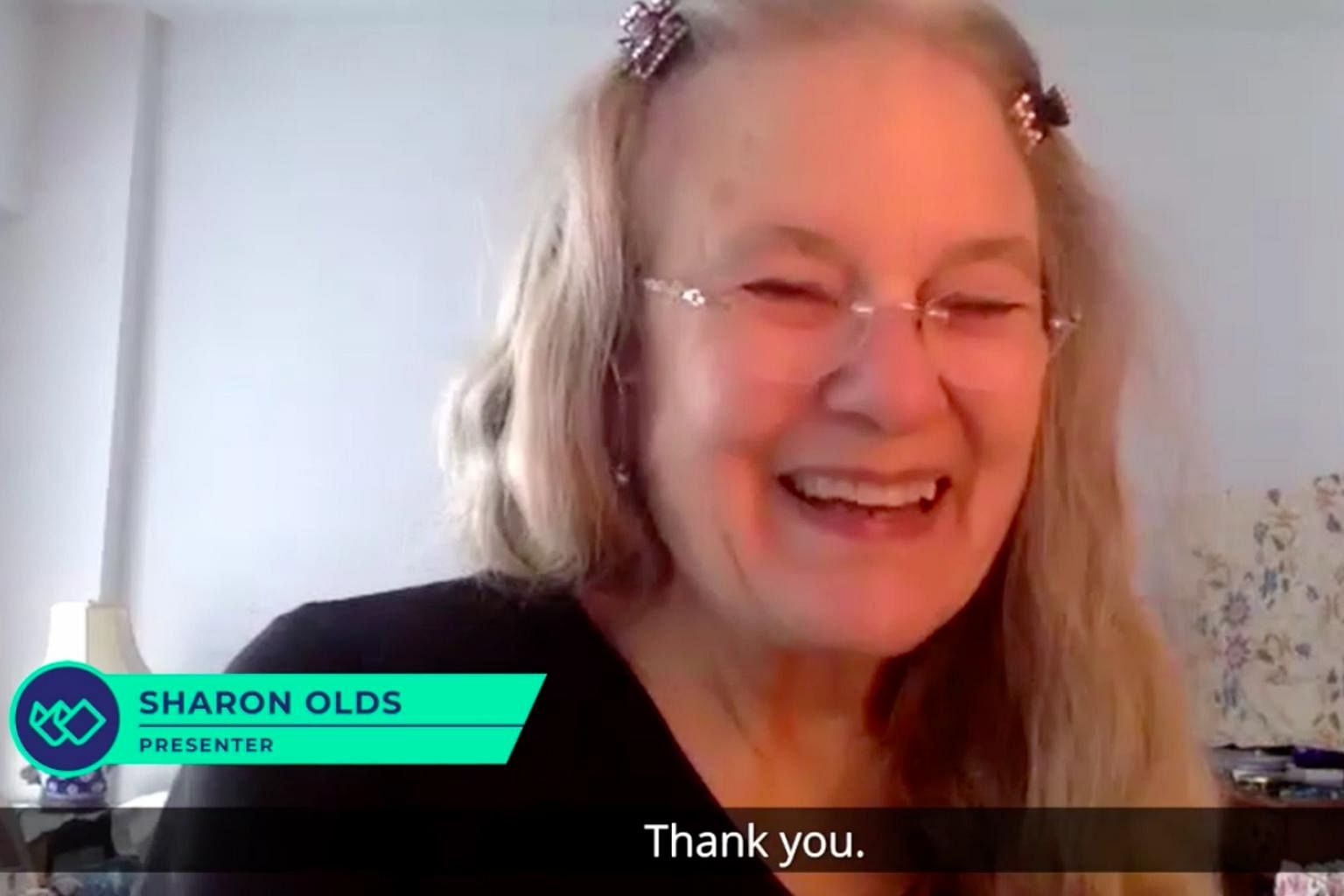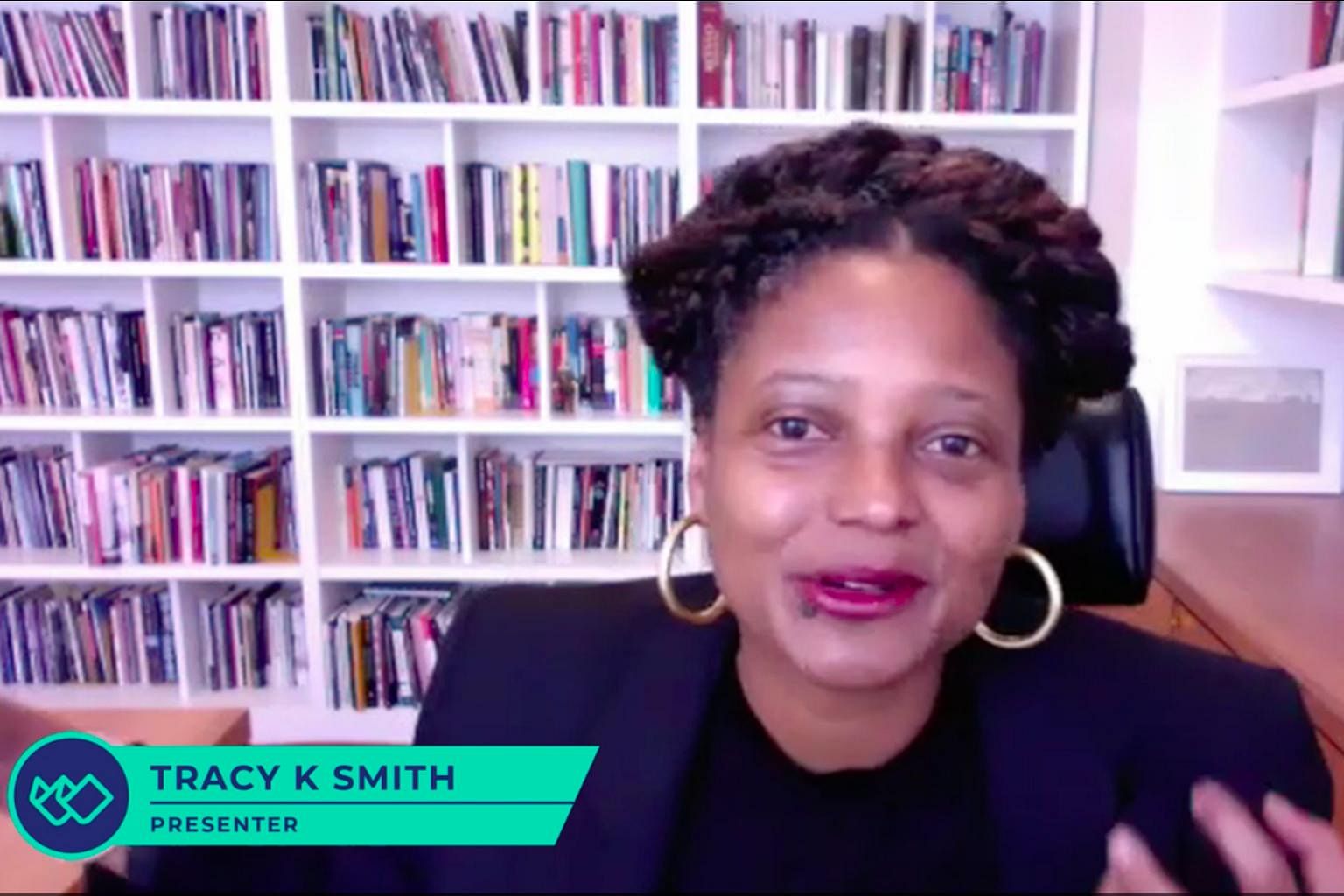SINGAPORE - The Covid-19 pandemic has tested the versatility of arts festivals everywhere, driving most online. The 23rd Singapore Writers Festival (SWF), organised by the National Arts Council from Oct 30 to last Sunday (Nov 8), has been no exception.
But, reworked to revolve around the theme of intimacy, it succeeded in questioning keenly and incisively what it means to connect to others in this time.
Helmed by poet Pooja Nansi - who juggled directorial duties with giving birth to her daughter three weeks ago - SWF brought on board a record 10 headliners, including veteran writers such as Margaret Atwood, 80, and Sharon Olds, 77, who might not have acquiesced so readily to a long-haul flight for a physical festival.
A plethora of digital commissions, from phone calls to virtual exhibitions, had varying degrees of success. The most enchanting was The Visitation, a phantasmagorical choose-your-own-adventure story written by Dave Chua and illustrated by Xiao Yan.
The festival was not without teething problems. At the outset, the Sistic Live platform would log me out when I tried to join a livestream, so I missed the first few minutes of several events.
There was a clear disparity in video quality between the moderators in Singapore and the presenters, many of whom were using basic home equipment.
It took days, sometimes a whole week, for video-on-demand programmes to appear. Eventually, the festival announced that video-on-demand availability would be extended to Nov 18.
Yet for all its flaws, there were moments in which the festival transcended the limits of its format to create unmistakeable connection.
Watching American poet Tracy K. Smith read her poem Wade In The Water and repeat the refrain "I love you" - said to her by a total stranger in a ring shout - I felt tears well up in my eyes. Though much reduced, the festival has managed to make a space of its own for the strange times we are living in.
Top eight festival highlights
1. In conversation with: Margaret Atwood

To get the grande dame of dystopia as festival headliner is quite a coup, even if only virtually.
The Canadian author of The Handmaid's Tale (1985) and the MaddAdam trilogy (2003 to 2013) dissected structures of power and spoke frankly about the controversial open letter against "censoriousness" that she signed in July.
Bleakly prescient though her fiction may seem, she said she remains "realistically hopeful" for the future beyond the pandemic. "We will get to the other side."
2. Zadie Smith: Intimations

The British author of novels White Teeth (2000) and On Beauty (2005) delivered some thought-provoking reflections on language and the "collective mania" of Internet platforms.
"One role writers have had historically is to alert people to ideology disguised as nature, or to the dream disguised as truth," she said.
"The biggest responsibility of any writer, in my view, is just to say that things could be otherwise... It is for the people collectively to imagine this great narrative that is something other than what we have."
3. Art Spiegelman: Serious laughter

Spiegelman, the man behind Maus - the first graphic novel to receive a Pulitzer Prize - took viewers on a deep dive into comics history and shared frank, funny anecdotes about what it is like to make comics during times of crisis.
He revealed that he had once contemplated a project about a fictional cartoonist, but chose to pursue Maus instead, and that he was "jealous" of Singaporean cartoonist Sonny Liew for having a similar idea with graphic novel The Art Of Charlie Chan Hock Chye, adding that Liew had more drawing skill.
4. Sharon Olds: An intimate life in poetry

Olds, a Pulitzer Prize-winning poet who has long made intimacy the hallmark of her work, was utterly endearing in her generous dialogue with Singaporean poet Cyril Wong.
She shared about how her poetry responds to the tradition of silence she was raised in and the autobiographical nature of her poems.
"We're in such terrible times, such times of awakening, and we are hearing from many poets that we didn't use to hear from," she said. "I'm glad that the young poets are leading us through and towards these difficult times."
5. Tracy K. Smith: The body of desire in poetry

"Poetry has always been good at manipulating time," said the former US poet laureate and Pulitzer Prize-winner. "Poetry has always been good at saying, 'We must leap out of this moment and into this other moment. We're doing a space-time transfer in this poem."
She gave a captivating series of readings and spoke of using poetry to address erasure and omissions in history, as well as looking at change from a cosmic perspective. "That helps me to make better sense of the setbacks that seem to characterise so much of what what we witness," she said.
6. A (teenage) love affair
It is rare for a panel about young adult novels and fanfiction to get top billing at a literary festival, but all three writers on this Youth Fringe panel, as well as moderator Felicia Low-Jimenez, freely avowed their fandom backgrounds and the empowering potential of fanfiction.
Bestselling authors Cassandra Clare of The Mortal Instruments series and Amie Kaufman of The Illuminae Files trilogy spoke about how they construct romances that readers get invested in and the dark side of fandom, like harassment from fans.
They and Singaporean novelist Anittha Thanabalan, who made her debut in 2019 with The Lights That Find Us, discussed diversity representation in young adult fiction, especially different kinds of sexuality.
7. Naomi Klein: Clarion call

Klein, the Canadian-American journalist and activist who wrote The Shock Doctrine (2007) and On Fire (2019), gave a stirring speech on the urgency of climate action, linking it to movements against racial and social inequality. "Having changed our lives to fight the (coronavirus), a great many people are hungry for more change," she said.
She spoke hearteningly of the "coalition of the elder and younger", in which different generations come together against the climate crisis, and of writing from a place of rage.
"I can't stay in that place of rage forever, but I also don't want to let go of it," she said. "I have a friend who used to sign off her letters with 'Love and rage', and I think that the fire has to come from both of those."
8. SWF closing debate: This House believes Singapore would survive the zombie apocalypse

The closing debate is typically the festival's most raucous event. Savagely moderated this year by writer Shamini Flint, it managed - despite a sparsely-populated Victoria Theatre and the undead topic - to be a lively affair high on entertainment value, if woefully low on zombie lore.
The proposition (The Walking Dead) shuffled along with a blithe faith in government systems, relying mostly on their MVP (most valuable player), novelist Suffian Hakim, who seemed to be the only person onstage who had given any previous thought to surviving a zombie apocalypse. Insider tip: his weapon of choice is a sharpened bamboo laundry pole.
But they were no match for the opposition (Resident Evil), who delivered a biting critique of Singaporeans' self-defence abilities beyond "Hello, police?"
Actresses Jo Tan and Rebekah Sangeetha Dorai quipped that locals mostly use their bomb shelters to store toilet paper hoards and that zombie-proofing your flat would probably run afoul of Urban Redevelopment Authority regulations.
Amid all the jokes, they got in some palpable hits about how marginalised minorities might actually fare better in an apocalypse than cosseted citizens.
In a year of unprecedented disaster, it is nice to know some catastrophes are yet to be.
-
BOOK IT/ SINGAPORE WRITERS FESTIVAL
-
WHERE Sistic Live (swf2020-live.sistic.com)
WHEN Video-on-demand until Nov 18
ADMISSION Festival pass, $12 from Sistic (call 6348 5555 or go to www.sistic.com.sg)
Books by the speakers are available at the online festival bookstore. For more details, go to the website.


